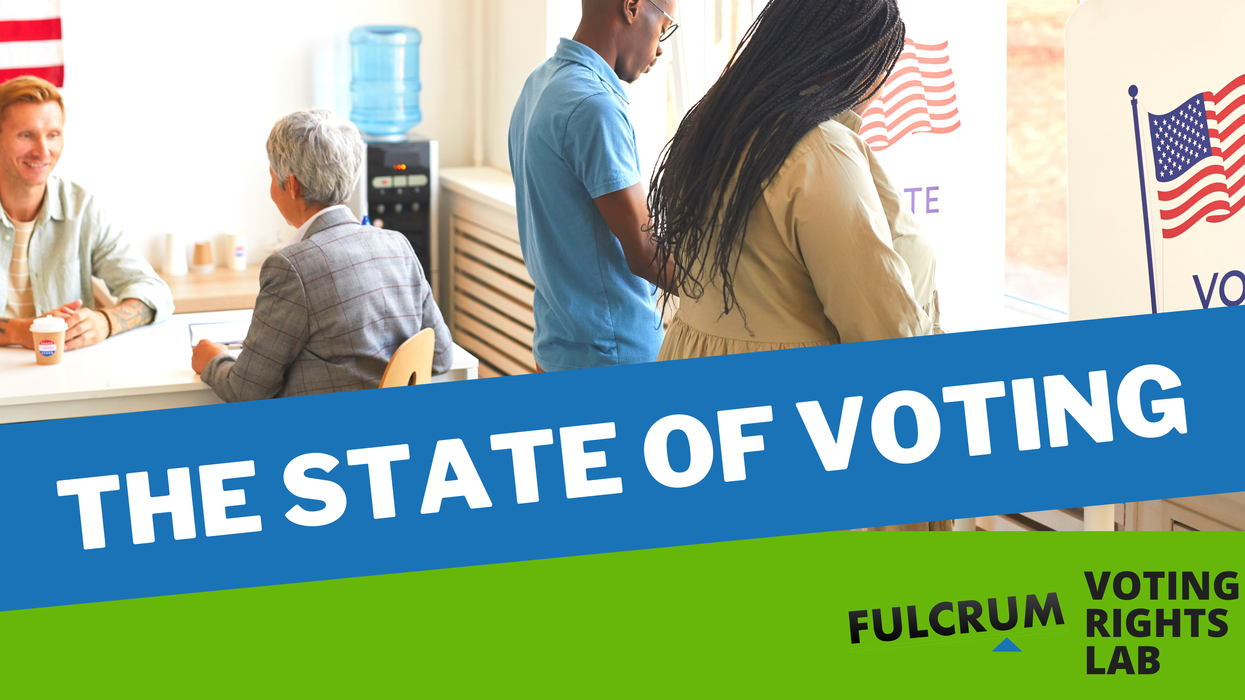This weekly update summarizing legislative activity affecting voting and elections is powered by the Voting Rights Lab. Sign up for VRL’s weekly newsletter here.
The Voting Rights Lab is tracking 2,154 bills so far this session, with 575 bills that tighten the rules governing voter access or election administration and 1,028 bills that expand the rules.
Empire State lawmakers passed the New York John R. Lewis Voting Rights Act, legislation designed to prevent race- and language-based discriminatory election laws and procedures. This landmark legislation is now on the governor’s desk. In Arizona, two bills that would improve voter access are headed to the governor. One would ensure voters who receive, but do not cast, mail ballots are still able to vote in-person and another would require the Department of Game and Fish to provide voter registration services during licensure transactions. California’s Senate passed protections for election workers, sending the bill to the Assembly. After an Oklahoma bill to bifurcate state and federal elections passed in both chambers, only one ratified the conference committee version, meaning the bill will not make it to the governor's desk.
Looking ahead, Gov. Kathy Hochul may sign the New York Voting Rights Act this week.
Here are the details:
New York sends the John R. Lewis Voting Rights Act to the governor. This legislation would create legal protections to prevent race- and language-based discriminatory election laws, rules and practices. In certain instances, it would require changes to election rules be pre-approved – or precleared – before going into effect, to ensure they will not have a discriminatory impact. The bill would also create private rights of action to facilitate injunctive relief when a law is discriminatory, as well as require all key voting materials to be provided in various languages. This legislation is now available for the governor’s signature.
In addition to this landmark bill, the Legislature also sent the governor a bill to protect the registration records (including addresses) of survivors of sexual violence. Similar protections currently exist for domestic violence survivors.
In Arizona, bills that would allow more voters to cast regular in-person ballots and expand access to voter registration services head to the governor. Last week, the Arizona Senate concurred on two bills that are now headed to Gov. Doug Ducey. S.B. 1460 would ensure voters who receive mail ballots can still cast regular ballots in person, after first surrendering their early ballot. Under existing law, all such voters are required to vote using provisional ballots.
Also heading to the governor for signature is S.B. 1170, which would require the Department of Game and Fish to provide voter registration services to people applying for a hunting, fishing or trapping license.
Election worker protections clear one chamber of the California Legislature. S.B. 1131 would create an address confidentiality program to protect election workers who are under threat, provide funding for the program, and generally remove the names of precinct board members from public disclosure materials. The bill would also prohibit a person, business or association from publicly posting online the home address of a program participant in specifically defined situations. The Senate also sent S.B. 1480 to the Assembly; that bill would allow certain disabled voters to return their ballots electronically.
Oklahoma nearly creates parallel state and federal election systems. If Congress enacted a law similar to this session's John R. Lewis Voting Rights Act or the Freedom to Vote Act, it would have a substantial impact on aspects of Oklahoma elections because the Sooner State’s election laws are, in some respects, among the most restrictive in the nation. In response to the potential passage of such a federal law, the Legislature passed bills through both chambers that would have created one system for state elections and a parallel system for federal offices. Because the chambers passed different versions of the bill, a conference committee created a new, third version that was then adopted by the House. Ultimately, the Senate chose not to vote on the compromise measure before the session ended on May 27. As a result, the bill was not transmitted to the governor.




















Trump & Hegseth gave Mark Kelly a huge 2028 gift